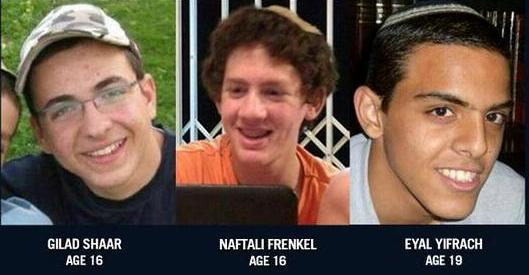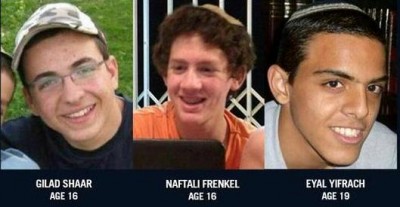In response to the abduction of three teenagers, Eyal Yifrah, Gil-ad Shaar, and Naftali Frankel, over a week ago in the West Bank, a petition to President Obama has been circulating around the Internet asking for the Executive Office to pressure the Palestinian Authority to release the one American citizen of the three kidnapped teenagers. I signed, then posted it to my Facebook page.
Several hours later, I decided to remove it. Unlike my usual practice, I won’t be linking to it here.
I realized that asking America to fight for that one teenager would not necessarily mean that I would be asking for the release of all three. As far as the American government is concerned, their top priority is the American citizen. This is not a critique of the Obama administration’s policies when it comes to the Middle East, some of which has resurfaced in the light of the kidnappings — this is merely the truth of the matter.
When I was a child, over the course of my outstanding Zionist education, I asked myself more than once: if I had to choose between Israel, my homeland, and America, my country, which would I choose? I hoped that, unlike Jews in other countries who experience anti-Semitism on a seemingly daily basis (we haven’t forgotten about you, France), I would never be placed in a position wherein I would have to choose between America and Israel. In high school, I fell in love with American Jewish history and Israeli and Zionist histories almost equally — and I still marvel at the relative level of acceptance that Jews in America enjoyed in comparison with Jews in Europe.
This petition, however, undermines the effort to raise awareness and build pressure to bring back the three teenagers. Instead, we pro-Israel activists prioritize our own American teenager over the other two Israeli teenagers. We cannot be expected to defend Israel when the moment push really does come to shove, we take steps to immediately protect our own. This petition allowed American Jews to pit themselves against Israel, and many chose America.
I’m not about to drop everything I have here in America make aliyah — far from it. I like it here in America, and I am comfortable in my American Jewish identity. I never want to have to choose between my Zionism and my Americanism. This petition, though, forced me to choose sides, or, at the very least to contemplate what might happen if I should have to choose, because instead of fighting to bring back our boys (and, yes, I am aware of how problematic that hashtag is to begin with), a number of American Jews collectively have opted to bring back our boy, simply because he is American.
While White House petitions might have at least a little more of an impact than blogging and social media campaigns, do we, American Jews, really want that to be part of the perception that other Americans have of us? Ultimately, the most we can hope for from these social media campaigns, prayer vigils, and rallies is to raise awareness and to bring about a larger response. But is the larger response that we are working toward for only one victim of the kidnapping, or for all three? I should hope it is for the latter.
We should be thinking of all three of the kidnapped teenagers, not just the one with the American passport. Yes, his passport matters for diplomacy purposes, but it does not change the reality that all three face as victims of a kidnapping. Our social media campaigns, our petitions, and our blog posts would be best kept to making sure that all three boys are brought back, not just the American. To say that helping the American is helping them all is not enough because we must not forget the other two teenagers.
To prioritize that one American teenager is to play favorites with the victims and is just one step away from victim blaming —essentially, akin to saying that the teenagers and their families are to blame for their own kidnapping because they live in the settlements. I am all for criticizing the Israeli and Palestinian governments and the occupation, and do so regularly, but that does not mean that I would choose to prefer one American over two Israelis.
To prioritize one teenager over the others is not a productive means of bringing back all three, nor does it contribute to the political discourse that needs to result from it; rather it hinders the American rescue effort by undermining the idea that we pro-Israel American Jews need not choose, that we can—and should—support Israel and its establishment as a Jewish democratic state and not have to sacrifice our comfort here as American Jews. This is not politicization, this is assigning blame and playing favorites, both of which are conductive to finding the three kidnapped teenagers.
Part of the political discussion should be about this petition. Now, we must ask ourselves: when push comes to shove, whose side should we have to be on? This petition gave me pause specifically because it might have meant that I would have to choose. And I hope, for all of our sakes, that none of us ever has to.
Amram Altzman is a student at List College.


